Does Washing Filter Media Lower Nitrates?
You might not be able to see them, but nitrates are hiding in every aquarium.
Understanding this invisible compound is an important part of maintaining happy and salubrious fish.
Today, I'grand going to teach yous everything yous would desire to know nigh them.
Before I proceed, I want to make sure you read The Nitrogen Cycle guide.
This cycle forms the foundations of what I am near to tell you.
Got it nether wraps?
Good.
Then, let'southward continue….
at a glance: OUR TOP PICKS FOR MAINTAINING NITRATE LEVELS
What are nitrates and where do they come up from?
Nitrates (NO3) are a class of dissolved nitrogen that occur naturally in the water column , which is the h2o inside your aquarium.
Exactly how nitrates get into your aquarium is quite a journeying… Nitrates are actually a by-product of biological waste.
Mutual sources of excess waste found in aquariums include:
- Uneaten fish food
- Fish poop
- Decaying plants
- Dirty filters
FishLab Fact: Overfeeding is the number 1 cause of high nitrate levels in aquariums. Not only practise overfed fish poop more, but any uneaten nutrient rots, leading to even more nitrates. Overstocking your aquarium comes in as a close second – watch that bioload!
But while waste product results in nitrates, information technology is non the cause of nitrates.
To explain, I am going to practice a very cursory recap of the nitrogen cycle.
Before waste becomes nitrates, there are a couple of steps that happen first.
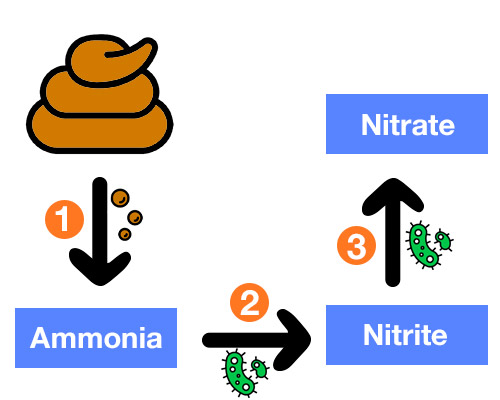
ane. Equally waste breaks down, it gives off ammonia.
2. A bacteria chosen nitrosomonas breaks downwards the ammonia into nitrites.
3. A second leaner, called nitrobacter so feeds on the nitrites and produces nitrates.
So without nitrites, nitrates in your aquarium wouldn't exist.
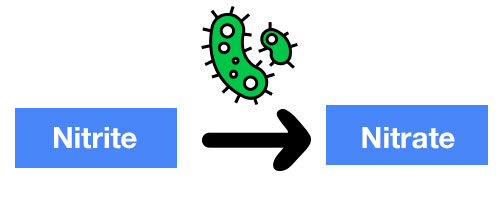
I know in that location is merely a single letter separating the two – nitrIte versus nitrAte…
Just don't get confused. The two are very different.
Nitrites are highly toxic to your fish, while nitrates are considered harmless, at least in pocket-size amounts.
Now, I must stress this… harmless in pocket-size amounts.
Over time, nitrates will build up in your aquarium. This process is continuous and unavoidable.
When this happens, you need to reduce the nitrate levels in your tank, which I tell y'all how to do afterwards in this guide.
What happens if your nitrate levels are besides loftier?
FishLab Fact: A sudden jump in nitrate levels is called a nitrate spike.
I'll exist frank with you lot, unless you stock sensitive fish or corals, it's unlikely that an increment in nitrate levels is going to outright kill your fish.
But that doesn't hateful that high nitrate levels are not dangerous in their own style.
You see, high levels of nitrates place your fish under incredible stress.
And when your fish are stressed, the following bug tin can arise…
1. Increased hazard of affliction
Have you ever gotten and so stressed that you became sick?
Well, that'south similar to what happens to your fish. The stress caused from increased nitrate levels brand your fish more than susceptible to diseases.
ii. Poor growth
Fish that are exposed to high levels of nitrates may have stunted growth, meaning they may never reach their total size.
3. Poor colour
Fish that are stressed past high levels of nitrates won't display their natural coloring the way they would nether normal, healthy conditions. You lot may even find that your fish'southward color volition fade.
iv. Damaged reproductive organs
If y'all are trying to brood fish, then you lot definitely want to go on nitrate levels low! High levels can damage reproductive organs, meaning your fish will be unable to brand babies!
5. Reduced life bridge
Fish that constantly live in h2o with high levels of nitrates do non live as long.
While some of these issues are reversible, others cause permanent damage to your fish or even shorten their lifespan.
To put it simply, if you want to raise happy and healthy fish, you need to go your tank's nitrate levels nether command.
What are the right nitrate levels for your aquarium?
The ideal nitrate levels for your aquarium depend on two factors:
- The type of tank (freshwater, saltwater, etc.), and
- The type of fish, plants or invertebrates you lot stock.
FishLab Fact: The measure for nitrates is ppm (parts per million). For you metric folk, this is the same equally mg/L (milligrams per liter).
In a perfect earth, nitrates should exist kept betwixt five-10 ppm or lower.
However, this is not always the case…
Whether it's due to a lack of time to perform proper maintenance, laziness or merely a lack of understanding, fish oftentimes live in farthermost nitrate levels.
But but considering your fish are surviving, that doesn't mean they are happy or healthy.
Beneath are suggested upper limits for nitrate levels that should not exist exceed for freshwater and saltwater tanks.
Freshwater tank nitrate levels
| Freshwater tank | < xl ppm |
| Planted tank | < xxx ppm |
| Brackish | > fifty ppm |
| Pond | > 50 ppm |
Saltwater tank nitrate levels
| Reef tank | < 1 ppm |
| FOWLR | < xxx ppm |
| Coral tank | 0.25 ppm |
Annotation: The nitrate levels in a higher place are general guidelines. Individual species of fish, plants or invertebrates may have more than specific requirements. And think: Merely because your tank is within those limits doesn't mean that your fish are happy.
As you tin come across from the charts, marine fish are much less tolerant of high nitrate levels than freshwater fish.
FishLab Fact: High nitrate levels can atomic number 82 to disease, cause reproductive failure and may even stunt growth in fish.
If you keep a hospital tank for any sick or injured fish, keep the nitrate levels in this tank below 10 ppm.
It is also worth mentioning that many varieties of algae feed off nitrates in the water.
Many algaes utilise nitrates every bit a nutrient source. In this example, I recommend keeping the nitrate levels below 10 ppm. This helps deprive the algae of its food source, making information technology easier to eradicate.
FishLab Fact: The "lower nitrates are meliorate" rule is thrown out the window if you have a planted aquarium. Many plants use nitrates for food, and in this case, low nitrate levels tin can actually cause issues and tin can fifty-fifty pb to a blue-dark-green algae (cyanobacteria) outbreak.
How do you test for nitrates?
To identify the nitrate levels in your aquarium, all yous need to do is go out and purchase a colorimetric test kit that is specifically for nitrates.
Nitrate exam kits are typically designed to work for both saltwater and freshwater aquariums.
If you have ever tested pH , so you will know how these test kits work.
Accept a sample of water from your aquarium, add a couple of drops of the solution included in the test kit and watch the water change color.
Below are two of the best nitrate exam kits around:
API Nitrate Test Kit
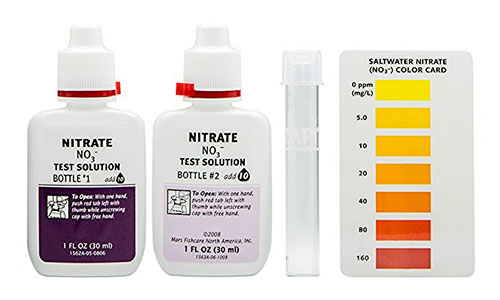
Lasts up to 90 tests If you walk into your local fish store, this volition likely be the test kit they keep on the shelf.
What can I say? It'due south cheap, and it works. For the everyday fish keeper, the API test kit will be more than appropriate.
If you purchased the API Master Test Kit , then you lot will already have this test kit, along with many others.
However, since nitrate examination kits are technically measuring nitrites, they take the same shortcomings that the nitrite test kits have – amine interference.
In sure cases, such as in reef tanks, essential amino acids – amines – can cause the tests to show a lower nitrate level than what is actually occurring in your tank.
Fortunately, there are test kits that get around this result.
Unfortunately, many of these kits are expensive.
But not this one…
Salifert Nitrate NO3 Examination Kit
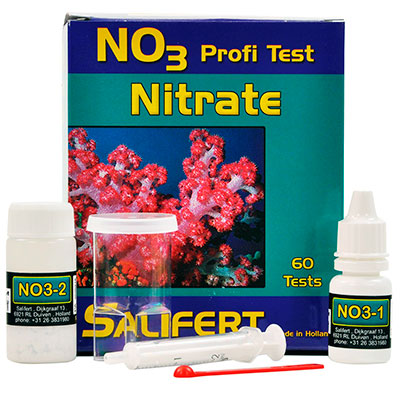
Lasts upward to 60 tests
This nitrate examination kit hits the sweet spot for both price and performance.
Information technology may not last as long equally the API test kit, but information technology makes upwards for this by being easy to use with accurate results.
The Salifert nitrate test kit is popular with many saltwater aquariums owners.
Since it tin can exist picked up for just a few more dollars than the API kit, I recommend making this your go-to nitrate test kit.
While nitrate test kits are piece of cake to use, their accuracy depends on your ability to follow the instructions.
I highly recommend reading the instruction manual thoroughly before using a test kit. Skipping a simple step, such every bit shaking the bottle, can cause an wrong reading.
How do yous remove nitrates from your aquarium?
Merely tested your nitrate levels and discovered it'due south through the roof?
Don't panic!
I am now going to cover all the ways you lot tin lower the nitrate levels in your aquarium.
Only before nosotros spring into this department, I want to make one thing clear:
The battle against nitrates is never over!
As long every bit your fish are eating and pooping, in that location is going to be waste in your aquarium, which means that unless y'all act, your nitrate levels are going to continually rise.
The only fashion to win this boxing is to remove every fish, Aquatic plant and natural organism from your tank – at which signal, I would hardly call information technology an aquarium.
If that isn't an option for you, and it shouldn't exist, then you need to monitor and reduce the nitrate levels on a regular footing.
So, the key takeaway is:
Y'all cannot eliminate nitrates – y'all can just control them.
Now that we have that out of the manner, let's take a closer await at the dissimilar ways you can remove nitrates from your aquarium.
1. Water change!
A fractional water change should already be a office your maintenance routine.
And if it isn't? Well, it's no wonder your nitrate levels are so high.
A h2o alter is a corking manner to instantly lower the nitrate levels in your aquarium.
Yous should also exist mindful that nitrates can be nowadays in tap h2o. This is a particular problem for those who describe water from wells.
If yous use tap water for your water change, test for nitrates earlier putting information technology in your tank. If high levels of nitrates are constitute, consider using a different water source, like reverse osmosis (RO) h2o.
If your aquarium is under control, a regular h2o change should be all that is needed to adequately reduce nitrates to safe levels.
However, for those who need a bit more help in the fight against nitrates, there are three more solutions to lower the nitrate levels in your aquarium.
Be mindful that these actress tips for removing nitrates won't supervene upon a water change – they should be used in addition to it.
two. Water conditioner
This is essentially a nitrate remover in a canteen. Merely add the recommended amount and watch your nitrate levels drib as if by magic.
Exactly how the water conditioner reduces nitrates varies from brand to brand. Some convert the nitrates to nitrogen gas, assuasive it to exit through the surface.
Other water conditioners bind the nitrates, rendering them harmless to fish and making information technology possible for the bacteria in your biological filter to destroy them.
Any the method, the end event is the same – lower nitrates.
I make it no clandestine that my favorite water conditioner is Seachem Prime…
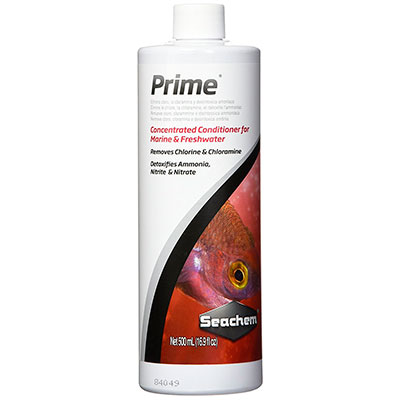
Not only can it detoxify nitrates, only it can likewise deal with nearly whatever other h2o quality issue that may ascend!
I highly recommend keeping a bottle on manus just in case of an emergency.
three. Nitrate removing filter media
While the bacteria in your filter might do a keen chore of getting rid of nitrites, nitrates are another story.
Y'all can give your filter a turbo charge by using a media that traps nitrates, removing them from the water.
Yous tin can besides use a bio-media, a media that uses bacteria to filter the water, for nitrate removal…
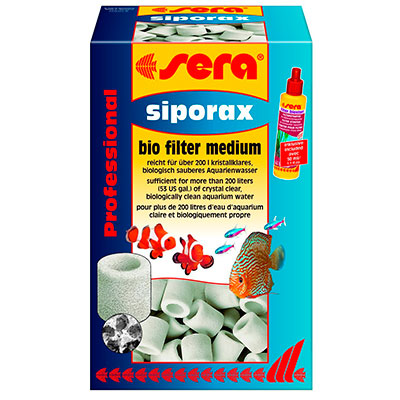
If yous have been in the fish-keeping game for a long time, yous might remember the name Siporax. If you are like me, yous probably thought that it had vanished forever.
Simply it turns out that Siporax is fantastic at encouraging the growth of denitrifying leaner that breaks downwards nitrates!
Realizing its potential, Siporax was reintroduced to the market by Paul Hughes, who owns 1 of the most impressive brandish tanks in the entire United Kingdom. [eleven]
There are as well nitrate reducing pads…
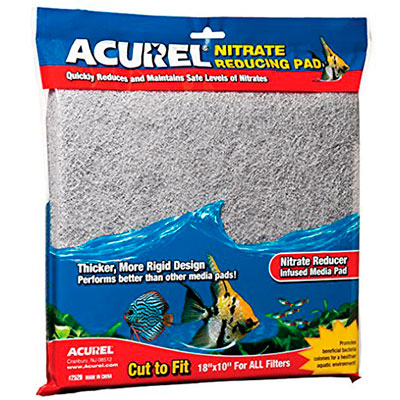
There are also nitrate reducing pads… These pads are infused with nitrate-reducing agents to trap and remove nitrates from your water.
The best part about these nitrate pads is that they can be cut to size.
Information technology doesn't thing whether yous take a pocket-size HOB filter or large pond filter, y'all are guaranteed that the pad will fit.
However, nitrate pads do accept an obvious drawback – they demand to be replaced constantly. The typical lifespan for a nitrate pad is 2-3 months, after which it needs to be tossed in the trash.
4. Get planting!
Plants naturally utilize nitrates.
This is why high nitrate levels often result in an algae outbreak.
However, it is of import to note that plants describe nitrates out of the tank h2o at unlike rates.
In fact, well-nigh plants are rather ineffective at lowering nitrate levels.
However, there is one planting solution that was designed specifically for nitrates… Rather than planting inside your aquarium, consider planting within your filter.
Plants such as lucky bamboo and desolation not simply look great when growing out the superlative of your aquarium, only their roots draw up nitrates as they pass through your filter, removing them from the system.
Important!
While at that place is no arguing that the methods listed to a higher place work exceptionally well at reducing nitrate levels, there is ane thing yous need to exist aware of:
These methods only remove nitrates – they don't ready the crusade of them.
If your nitrate levels are constantly spiking, so it won't matter how frequently you reduce the nitrate levels in your aquarium. The cause is still there.
Just don't worry, I have a solution for you lot…
How practice y'all prevent nitrates from building up?
If you read my guides on ammonia and Nitrites, then y'all volition already be fully aware of the advice I am going to give you.
That's because ammonia, nitrite and nitrate share a common cause.
Waste -> Ammonia -> Nitrite -> Nitrate.
It all starts with waste material.
Past getting waste under control, you lot minimize any bug caused further down the nitrogen cycle.
While these tips won't remove or reduce existing nitrates in your aquarium, they will stop new nitrates from building up equally quickly – which is a good matter!
1. Don't overfeed your fish!
The more your fish eat, the more they are going to poop. And the more than they poop, the faster nitrates will build up inside your aquarium.
I would as well add that any nutrient that remains uneaten sinks to the bottom of your aquarium and rots. And, you know what that means? More nitrates!
Remember, merely because you don't overfeed your fish doesn't mean that someone else in your family isn't.
I learned this the hard way… I kept finding uneaten pieces of food rotting in the corner of my tank. I feed my fish a premeasured amount, and they eat every concluding piece. Merely where this extra nutrient was coming from had me stumped.
Well, it turned out my nephew was sneaking in and feeding the fish when I wasn't looking. Mystery solved.
two. Maintain your plants
If you lot have live plants in your tank, then you want to incorporate a bit of underwater gardening.
Over fourth dimension, quondam leaves on your found will dice.
When this happens, the leaves fall off and disuse, which leads to an increase in nitrate levels.
Get ahead of this by doing a scrap of light pruning.
Every fourth dimension you run into dead or dying $.25 of constitute matter, snip them off and remove them from your aquarium.
3. Clean your filter
You know all those loose $.25 of food, plant organic thing and poop? Well, they are sucked up and trapped by your filter.
With fourth dimension, this waste accumulates. When this happens, your filter turns into a nitrate factory.
Regular maintenance volition stop the built-up waste matter from reaching problem levels.
I popular solution is to use an intake sponge filter – literally a sponge that covers the intake to your filter.
The sponge traps whatsoever gunk that floats through the aquarium h2o, trapping it before it reaches your filter.
Simply remove the sponge to make clean it – no more taking your filter autonomously!
4. Take hold of a gravel vac
substrate can apace become a graveyard of rotting fish food, dead plants and whatsoever else that gets caught up in information technology.
All of these contribute to nitrates forming in the water.
A gravel vac is 1 of the most constructive ways to remove this from your substrate.
Easy to employ, affordable and effective – if your tank has a substrate, there is little excuse for non owning a gravel vac.
Ideally, you should be performing a gravel vac during most, if not all, water changes.
5. Monitor your stock
An overstocked aquarium is going to accept more than nitrate problems than an understocked one.
Information technology's unavoidable. As well many fish in a small aquarium volition create more waste material than the fish tank can handle, which is a surefire recipe for a spike in nitrate levels.
If your fish tank is overstocked, you have two solutions:
- Become rid of some of your fish or
- Buy a larger aquarium.
I know it can be difficult to say goodbye to fish, but it's for their own practiced. They are just going to suffer in an overstocked tank.
Or, if you don't want to say goodbye to your fishy friends but however, buy a bigger tank.
You have been looking for a good excuse to buy a larger aquarium, and nitrate problems are as good a reason as any to make the upgrade!
Don't exist tempted to buy more fish now that y'all have a larger tank – that's what got you into this whole mess in the first place.
Conclusion
Phew! If y'all are still with me, then you made it to the cease of this guide!
I know it's a lot to take in, merely nitrates are an important office of every aquarium, and understanding their office and how to command them is essential to raising happy and good for you fish.
Do yous have any nitrate tips? Let me know in the comments beneath!
Does Washing Filter Media Lower Nitrates?,
Source: https://fishlab.com/nitrate/
Posted by: warnerhipt1970.blogspot.com


0 Response to "Does Washing Filter Media Lower Nitrates?"
Post a Comment